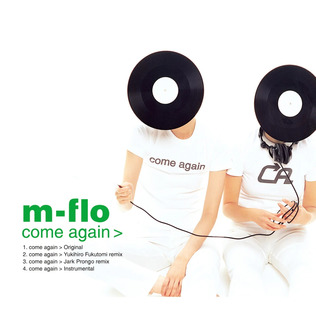
M-Flo is a Japanese hip hop group consisting of Taku Takahashi, Verbal and Lisa.

Beat Space Nine is the fourth studio album released by the Japanese group M-Flo. The record is presented in the metaformat of a spaceliner's in-flight entertainment system, specifically that of "Global Astroliner", constituting a recurring theme in the group's albums. Similarly to their previous works, the majority of the tracks contain guest features—including that of Bennie K, Yoshika, and Emyli.

Verbal is a Japanese rapper, music video director and record producer who debuted in 1998 as a member of the hip hop group M-Flo. He is a third generation Zainichi Korean and a notable representative of Zainichi Korean music in Japan.

Taku Takahashi is a Japanese DJ and record producer who debuted in 1997 as a producer of the hip hop group M-Flo. The group rose to prominence in the early 2000s, with hit singles such as "How You Like Me Now?" and "Come Again." Takahashi was also a member of Avex's 20th anniversary dance music project Ravex, and has produced songs for musicians such as Crystal Kay, Ami Suzuki and Rie Fu, and remixes for Hikaru Utada and Ayumi Hamasaki. He formed the record labels Tachytelic Records and TCY Recording.

Cosmicolor is the fifth studio album by Japanese hip-hop group M-Flo. Two singles preceded the release of the album: "Summer Time Love" featuring Emi Hinouchi & Ryohei was released on June 28, 2006, and "Love Song" featuring Bonnie Pink was released on November 8, 2006. The full album was made available via Rhythm Zone on March 28, 2007.
The discography of Japanese singer Mai Kuraki consists of fifteen studio albums, six compilation albums, twenty-three video albums, three remix albums, fifty-six singles, and sixteen promotional singles. Kuraki debuted in 1999, while she was still in high school, through Giza Studio. The label initially marketed Kuraki in the United States under the name Mai K, and released the single "Baby I Like" (1999). However, the single was a commercial failure which prompted the label to send her back to Japan. There, they released her single "Love, Day After Tomorrow", which peaked at number two on the Oricon Singles Chart and was certified million by the Recording Industry Association of Japan (RIAJ). The second single, "Stay by My Side" became her first number one single on the chart. Kuraki's debut album, Delicious Way, topped the Oricon Albums Chart and was certified triple million by the RIAJ.

4 Real is fourth studio album by Japanese recording artist Crystal Kay. It was released via Epic Records Japan on November 27, 2003, and was made available as a stand-alone CD and for digital consumption. The title 4 Real is play on the phrase "for real"—signifying the singer's fourth record. It contains primarily contemporary R&B influences and saw contributions from various songwriters and producers, including M-Flo, Yoshika and Keri Hilson, among others. The album spawned four singles, which were all released over the course of 2003.

Astromantic is the third studio album by the Japanese hip-hop group M-Flo. It was released on May 26, 2004, through Rhythm Zone. Remixes of songs from this album were released as Astromantic Charm School. The album spawned three singles featuring different singers: "Reeewind!" with Crystal Kay, "Miss You" with Melody, and "The Love Bug" with BoA.

"Right Round" is a single performed by American rapper Flo Rida featuring guest vocals from American singer Kesha. It was released as the lead single from his second studio album, R.O.O.T.S. (2009). It was released to radio on January 27, 2009 and was digitally released on February 10 by Poe Boy Entertainment and Atlantic Records. The song heavily interpolates the chorus of the Dead or Alive song "You Spin Me Round " in its hook. According to one of the song's writers, the chorus refers to a stripper. Kesha contributed guest vocals to the song, but was uncredited in the United States and Canada during its run atop the charts.

Kana Nishino is a Japanese singer and songwriter signed with SME Records' Newcome Inc. She debuted on February 20, 2008 with the single "I".
The following is the discography of American musician Babyface.
SoulJa is a Japanese hip-hop musician and songwriter best known for his collaborations with singer Thelma Aoyama, "Koko ni Iru yo" and "Soba ni Iru ne" – the latter of which was the former Guinness World Records holder for the best selling digital single of all-time in Japan.

To Love is the second studio album by Japanese recording artist Kana Nishino. It was released on June 23, 2010, by SME Records. Beginning sometime in 2009, the album's production was handled by several music producers, such as Jeff Miyahara, Giorgio Cancemi, Daniel Sherman, Mats Lie Skåre, ViVi, Andreas Levander, among others. It also features a guest appearance from Japanese hip-hop and reggae musician Minmi. Nishino contributed towards the album as the executive songwriter. to LOVE is primarily a J-pop album with numerous elements of dance-pop, pop rock, R&B, electropop, adult contemporary, and pop ballads.

The First is the first Japanese studio album by South Korean boy group Shinee. The album was scheduled for release on November 23, 2011; however, it was delayed to December 7, 2011, in Japan under EMI Music Japan. The album features three previously released singles, "Replay", "Juliette" and "Lucifer", all of which ranked within the top three on the Oricon Singles Chart.

Japonesque is the tenth studio album by Japanese recording artist Kumi Koda. It was released on January 25, 2012 by Rhythm Zone. It was also released just a little under a year after her 2011 album, Dejavu. Japonesque marks Koda's tenth consecutive studio album to be produced by Japanese producer and manager Max Matsuura, amongst many other producers, while she contributes to the album as the lead vocalist, background vocalist, and songwriter to majority of the songs. Recorded in Japanese with minor phrases in English language, Japonesque is a Japanese pop album with numerous musical elements such as dance music, R&B, electronica, and rock music.

The discography of Japanese-American singer-songwriter Ai consists of thirteen studio albums, four extended plays (EP), seven compilation albums, one live album, one mix tape, ten video albums and numerous solo and collaboration singles.
The discography of M-Flo features nine studio albums, nine compilation albums, one live album and 25 singles. These were released on Labsoul Records and Avex Group independent label Rhythm Republic in 1998, and from 1999 onwards released through Rhythm Zone.

South Korean pop group TVXQ, known as Tohoshinki in Japanese releases, have released 74 singles, 3 featured appearances, and 27 soundtrack appearances. The group signed with S.M. Entertainment in 2003 and released their debut single "Hug" in January 2004, peaking at number four on the Monthly Albums Chart of the Music Industry Association of Korea (MIAK). Their following single "The Way U Are", released in June 2004, entered the MIAK Monthly Albums Chart at number one.
Japanese singer-songwriter Mai Kuraki has released twenty-five video albums and three video singles, and been featured in sixty-six music videos, two television series, and eleven commercials. Kuraki debuted in 1999, while she was still in high school, through Giza Studio. The label initially marketed Kuraki in the United States under the name Mai K, and released the single "Baby I Like" (1999). However, the single was a commercial failure which prompted the label to send her back to Japan. There, they released her single "Love, Day After Tomorrow", which peaked at number two on the Oricon Singles Chart and was certified million by the Recording Industry Association of America (RIAJ). The second single, "Stay by My Side" became her first number one single on the chart. Kuraki's debut album, Delicious Way, topped the Oricon Albums Chart and was certified triple million by the RIAJ.

"Come Again" is a song recorded by Japanese hip-hop trio M-Flo for their second studio album Expo Expo (2001). It was released as their 9th physical single through Rhythm Zone on January 17, 2001. Serving as the second single for the album following "How You Like Me Now?", the release contains two additional remix tracks as well as its instrumental version.















